

Aaron Roth – Edify.org – “Peace is a Possibility“ – Mar. 2013
Hi family and friends, I’m now in Lima, Peru. After traveling through Central America: Nicaragua, Guatemala, and Honduras, I’m now in Peru to investigate potential partnerships and explore urban/rural communities looking for small, Christian schools that would fit the Edify school program. It’s been two weeks so far in Lima and its been a wonderful experience. After three months of constant travel, I’ll stay here for awhile. Blessings, -Aaron
Honduras was rough for me. Probably the rockiest two weeks I’ve had in the past three months. The bulk of my journey has been a wonderful experience, pleasant and easy to get around, but for some reason, Honduras was very different. Now that I’m in a safe country, safe neighborhood, with plenty of options for transport and mobility, I look back on what made Honduras so different from the other three countries I’ve come to know:
Peace.
I didn’t feel it in Honduras. I have traveled in some dangerous places in the past few years, and I have lived in each of those so I know that it is my own responsibility to create a sense of stability and 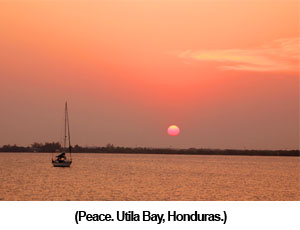 safety where I live, but I just found that difficult in Honduras. For one, everything closes at 6:00 or 7:00pm due to the danger of theft or robbery in the evening. Banks stop taking deposits at 4:00pm, and close their heavy doors at 5:00. Everything is guarded by private security with weapons, even the Burger King.
safety where I live, but I just found that difficult in Honduras. For one, everything closes at 6:00 or 7:00pm due to the danger of theft or robbery in the evening. Banks stop taking deposits at 4:00pm, and close their heavy doors at 5:00. Everything is guarded by private security with weapons, even the Burger King.
All those characteristics of a place still don’t bother me. It’s par for the course when you choose to live and work in developing countries. Indeed, in the countries where Edify works, safety and security are consistent issues for us and our staff. What I think bothered me the most about my time in Honduras is how people talked about the place even before I got there, and the daily conversations they had in relation to the country. It was all negative, all about the violence and the danger, and the possibility of getting robbed, maimed, or kidnapped. I was like, “Seriously? All of that could happen?” I thought to myself that in regards to statistics, I’m just as likely to be the victim of an assault in one of our large cities in the US.
It bothers me that so much of the language about developing countries is so negative. Indeed that’s what you see published so often in the news or on the internet. Stereotypes are incredibly powerful and they can shape our understandings and expectations of a place. Take for example these two pictures:
The picture on the left is of Guatemala. One of the many Mayan communities that preserve their history and tradition, and welcome travelers like me. This is San Pedro La Laguna, on Lago Atitlan, where I studied Spanish for almost four months. The picture on the right is from a food court in a mall in Tegucigalpa, Honduras. I was watching the Honduras national soccer team play Mexico. I was celebrating the second goal that Honduras scored with more than 500 Hondurans. It was one of the most enjoyable soccer experiences I’ve had in recent memory. Now look below at these two pictures:
The picture on the left is from Guatemala. It’s what you’ll find when you do a Google image search and what you’ll most likely find if you want to learn about Guatemala’s safety. The picture on the right is from Honduras, and you’ll find these gang members in most Google image searches and articles about Honduras.
Which series of pictures sticks out in your mind? It’s a good question, right? For me, the second series were the first pictures I encountered before actually visiting the countries. It would have been a shame to think that these countries could only be represented by their problems with the drug trade and gang members.
You may remember a previous newsletter about Haiti (“A New Stamp, A New Story” – Sept. ’12) 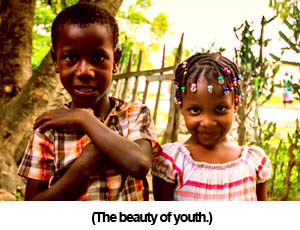 where I encountered similar initial negative stereotypes:
where I encountered similar initial negative stereotypes:
“What’s important to know though, is that there always has been, and still is, an incredible amount of beauty in the nature of the Haitian people and in their country. We cannot overlook the presence of wonderful things simply because of some negative stereotypes. Indeed, that became abundantly clear on a visit to a savings group in the small village of Sodo.”
I do abide by good Christian council that says “Trust in God, and fasten your seatbelt.” So I’m not saying we should do away with the precautions given to us by the international organizations that monitor statistics of gangs and violence nor our embassy. What I am saying is that for precisely the 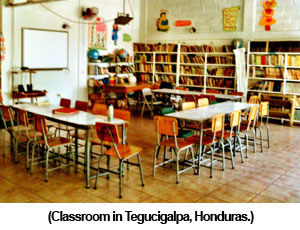 reason Honduras is a difficult place to live and travel gives us even more cause to help bring hope and Christian witness to difficult areas.
reason Honduras is a difficult place to live and travel gives us even more cause to help bring hope and Christian witness to difficult areas.
On one such occasion in the capital of Honduras, visiting a local Baptist school talking with Pastor Manuel, I asked him about the violence in the community. He said, “Well, thanks to the Lord we haven’t had one instance of violence or robbery to any one of our 275 students in the 10 years we’ve had this school. The community knows and respects this place of worship and education. It is a light in the community and they want to preserve and protect it.”
I believe Pastor Manuel has a vision for what Christian witness looks like in places that are so dangerous most people don’t even want to go visit. Two verses come to mind when I think about the need for the light and hope of the Gospel and what we are doing in Edify: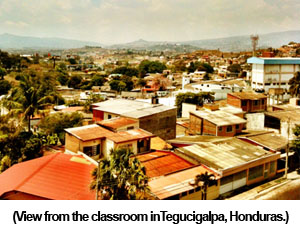
“Blessed are the peacemakers, for they shall be called sons of God.” (Matthew 5:9 NIV)
“Come to me, all who labor and are heavy laden, and I will give you rest. Take my yoke upon you, and learn from me, for I am gentle and lowly in heart, and you will find rest for your souls. For my yoke is easy, and my burden is light.” (Matthew 11:28-30 NIV)
It is not easy the work that we do, but it is work that can turn not only the perception, but also the reality of communities to be ones of prosperity and goodness.
I pray that you are finding ways to turn what is broken in your community into what is healing and inviting so that more will see the good in dark places.
Blessings to you and your family,
-Aaron
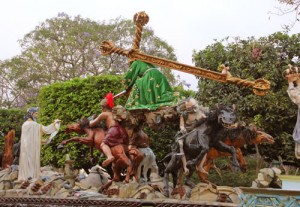 I suppose you can only evade getting robbed or pick-pocketed for so long. For me, it was 2.5 years without a problem. I’ve had to dodge many a sketchy situation and make Irish exits out of plenty of street conversations, and even more conniving, pretend that I don’t know either English or Spanish. Just now, as I write this, I’m reminded that just 2 hours ago some guy was talking to me saying “Hey friend, friend! Listen, wait a second.” I just breezed on by. Why? I don’t know him, and if he really needs help or directions, there are loads of Peruvians nearby that can attend to him.
I suppose you can only evade getting robbed or pick-pocketed for so long. For me, it was 2.5 years without a problem. I’ve had to dodge many a sketchy situation and make Irish exits out of plenty of street conversations, and even more conniving, pretend that I don’t know either English or Spanish. Just now, as I write this, I’m reminded that just 2 hours ago some guy was talking to me saying “Hey friend, friend! Listen, wait a second.” I just breezed on by. Why? I don’t know him, and if he really needs help or directions, there are loads of Peruvians nearby that can attend to him.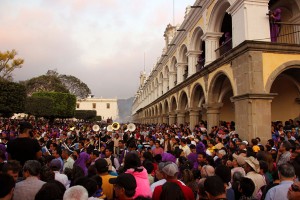 ding in the multitudes watching the “El Señor de la Caida.” (Just Google it) And after checking that my phone, camera and wallet were securely in place at least four times, and after a wave of pushing. I knew I had to get out of the crowd. I still had everything before the second wave of pushing, but somehow, somebody, probably a young person, reached their hand into my front pocket and grabbed my wallet.
ding in the multitudes watching the “El Señor de la Caida.” (Just Google it) And after checking that my phone, camera and wallet were securely in place at least four times, and after a wave of pushing. I knew I had to get out of the crowd. I still had everything before the second wave of pushing, but somehow, somebody, probably a young person, reached their hand into my front pocket and grabbed my wallet.

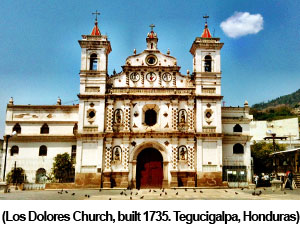 Edify worldwide –
Edify worldwide –  safety where I live, but I just found that difficult in Honduras. For one, everything closes at 6:00 or 7:00pm due to the danger of theft or robbery in the evening. Banks stop taking deposits at 4:00pm, and close their heavy doors at 5:00. Everything is guarded by private security with weapons, even the Burger King.
safety where I live, but I just found that difficult in Honduras. For one, everything closes at 6:00 or 7:00pm due to the danger of theft or robbery in the evening. Banks stop taking deposits at 4:00pm, and close their heavy doors at 5:00. Everything is guarded by private security with weapons, even the Burger King.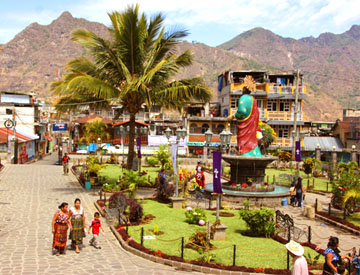
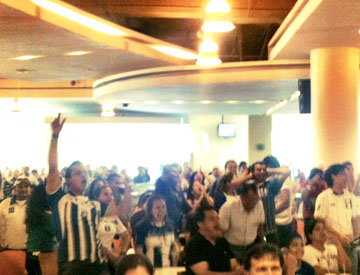
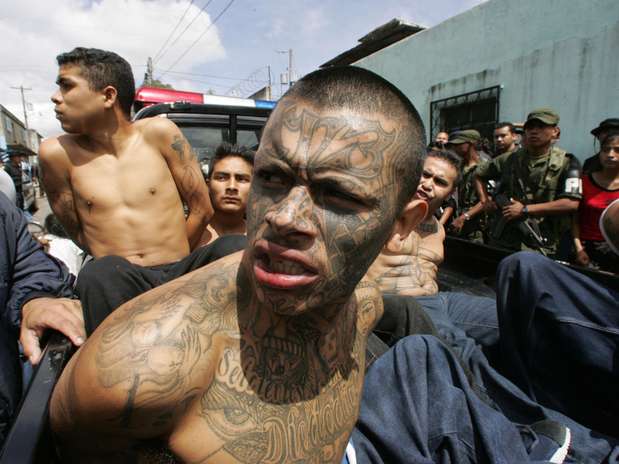
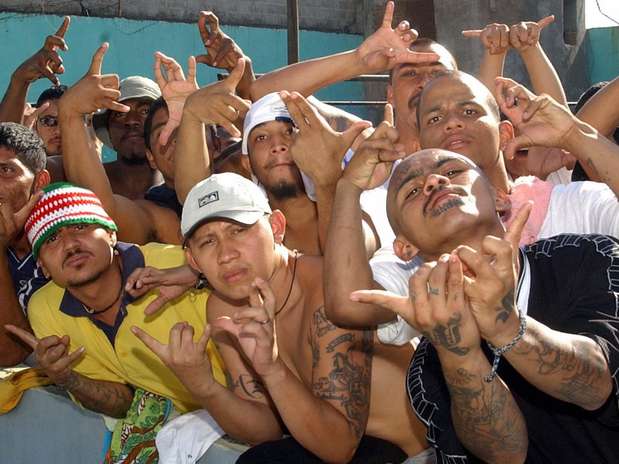
 where I encountered similar initial negative stereotypes:
where I encountered similar initial negative stereotypes: reason Honduras is a difficult place to live and travel gives us even more cause to help bring hope and Christian witness to difficult areas.
reason Honduras is a difficult place to live and travel gives us even more cause to help bring hope and Christian witness to difficult areas.
